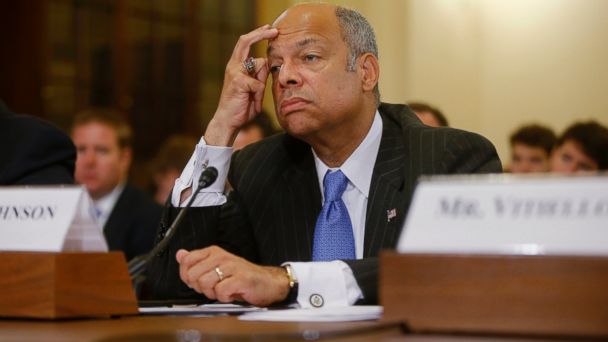DHS Chief Blames 'Horrible' Conditions for Child Immigrant Spike, Not Deferred Action

(Photo Credit: Charles Dharapak/AP Photo)
Deferring action against undocumented immigrants who arrive in the United States as children is not to blame for the mass migration of unaccompanied minors to the U.S. Southwest border, but rather the conditions in their homeland, Department of Homeland Security Secretary Jeh Johnson said today.
"Conditions in Honduras are horrible," Johnson said, citing one example on the same day the State Department warned U.S. citizens about "critically high" crime and violence there. "[It's] the murder capital of the world."
Johnson testified at a House hearing in Washington today that cartels are telling people they can get a "permiso" that gives them access to the United States, which is "not the case."
"They [the children] are given a notice to appear in deportation proceeding," he said. "We are required to give that child to HHS [Health and Human Services] and HHS is required to act in the best interest of the child, [often] placing the child with a parent. But that's not a free pass."
White House Adding Manpower to Deal With Flood of Migrant Kids
No Executive Action on Immigration Overhaul for Now
Conservative Congress members such as Peter King, R-N.Y., disagreed, telling Johnson, "It is a free pass from their perspective" because they are allowed into the United States at all.
To date, more than 50,000 unaccompanied minors from Guatemala, El Salvador, Honduras and Mexico have been apprehended by border patrol, up 99 percent from the same period last year, with the vast majority coming through the Rio Grande Valley sector - the quickest route from Central America. The highest numbers of children who cross come from Honduras and Guatemala
By law, unaccompanied minors must be transferred to Health and Human Services (HHS) within 72 hours, a timeline officials are failing to meet.
"We are not meeting the 72 hours," Craig Fugate, administrator for the Federal Emergency Management Agency, said during the hearing. "We wanted to get these kids as quickly as we could from a detention facility to a bed … at this point we have not reached the 72-hour [requirement], but reached more capacity. We have increased capacity but the number of children have increased as well and we have not reached the 72-hour mark."
Once in HHS custody, the child is then transferred to the custody of a parent or guardian, or even foster care. "I know that just over 50 percent of those unaccompanied children that HHS is placing, is placing with a parent," Johnson said, referring last fiscal year's data.
But there is no available data on how many of the children, once transferred out of HHS custody, actually appear in court or are deported.
When pressed on why Customs and Border Protection can't just return these children to their homeland, Johnson said the law doesn't allow him to do so. "I don't believe that the law would allow us to send an unaccompanied child home in expedited removal proceeding," he said. "The law requires that once a child is identified as unaccompanied, CBP has to give them to HHS and they do what's in the best interest of the child. That is what the law passed by Congress requires."
Rep. Mike Rogers, R-Ala., asked whether President Obama could simply issue an executive order to supersede the law, to which Johnson replied, "last I checked, an executive order can't supersede the law."
House Speaker John Boehner, R-Ohio, announced today the establishment of a GOP working group to address the border crisis, outlining again the request to send the National Guard to help stem the tide. But while Secretary Johnson said during the hearing he has heard those calls, he'd want to "understand better what the options are for the use of the Guard" and cited concerns about their limitations.
The National Guard "can't be directly involved in law enforcement," he said. "And Department of Defense has a lot to say about this as well. It's their resource, comes out of their budget. Lot of demands on the Guard, particularly in this season, hurricane season."
The Posse Comitatus Act 1878 (updated in 1981) works to limit the federal government's use of the military to enforce state laws and, as such, bars it from performing tasks of civilian law enforcement such as arrests or apprehensions.
While there is precedent for sending the Guard, the concern now stems from the fact that children are not evading law enforcement but instead surrendering, or even running toward patrol.
"They are essentially coming in an area that is well known by us, well patrolled by us, and they are not evading us," Ronald D. Vitiello, deputy chief of U.S. Customs and Border Protection, said.
Johnson said DHS has been updating members of Congress with conference calls twice a week and are working on a site visit for members and their staff.
As part of their outreach efforts to correct the perception in Central America, Johnson made a public plea to parents of Central America children this weekend, writing an op-ed for Spanish-language outlets, saying. "Sending your child to travel illegally into the United States is not the solution."
"It is dangerous to send a child on the long journey from Central America to the United States. The criminal smuggling networks that you pay to deliver your child to the United States have no regard for his or her safety and well-being - to them, your child is a commodity to be exchanged for a payment."